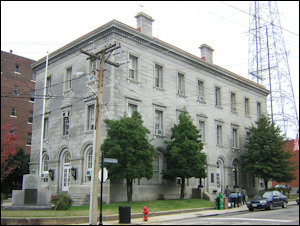The City of Petersburg is on its own. There appears to be no sentiment in either the McAuliffe administration or the General Assembly for cutting the fiscally ailing city any slack. Even the city’s own representatives in the legislature aren’t pushing for any special treatment by the Commonwealth.
“There is a feeling that the state doesn’t want to reward poor public performance,” Secretary of Finance Richard D. “Ric” Brown told the Richmond Times-Dispatch in an article appearing today.
A bailout of Petersburg is out of the question, said Del. Steven Landes, R-Augusta, who is heading a subcommittee to study the problem fiscally stressed localities. “I’m not aware where the state has ever stepped in to provide a locality a bailout,” he said. “I don’t see that happening.”
The state requires localities to file Comprehensive Annual Financial Reports (CAFRs) each year with audited financial data. Landes said his committee will look into what the state can do to shorten its response time when a locality is heading toward a fiscal cliff. “We want to make sure that audit information is getting to the money committees and the administration, because we would much rather be kept abreast sooner rather than later.”
Bankruptcy is not an option either. Federal law allows financially distressed localities, public utilities and school districts to see the protection of Chapter 9 bankruptcy court, and more than 50 localities nationwide have sought it over the past seven years. But Chapter 9 refuge requires state approval, and Virginia law does not allow localities to file for bankruptcy.
Bacon’s bottom line: It is reassuring to see the state drawing a cordon around the badly managed city. Citizens have to clean up their own mess. A likely first step is to throw the bums out and replace them with more competent individuals. If the crisis impels a new leadership to re-think how core government services are provided, Petersburg could emerge better and stronger than before.
Moreover, Landes’ subcommittee can play a helpful role in spotting financial warning flags in other localities before they reach crisis dimensions. Citizen leaders of many small localities (and even some large ones) lack the knowledge to read the CAFRs with any discernment. One useful thing that the state can do is to monitor the CAFRs of all jurisdictions and let their elected officials know if their numbers are looking problematic.



